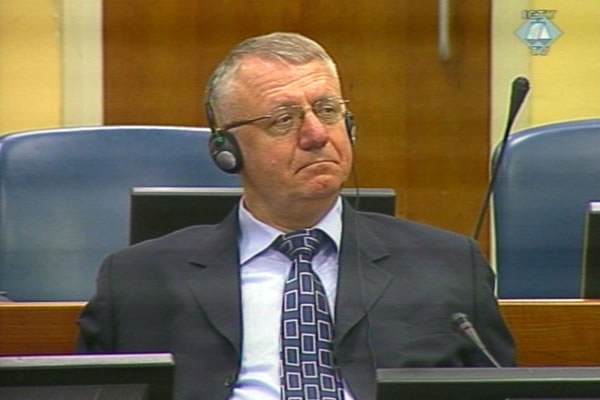Home
PROSECUTOR: 28 YEARS IN PRISON ADEQUATE FOR SESELJ’S CRIMES
The prosecutors contend that they have proven the responsibility of the Serbian Radicals’ leader for ‘cruel crimes’ against civilians in Croatia, Vojvodina and BH. The crimes include the murder of children and newborn babies, pregnant women, the elderly and the sick, carving crosses into the bodies of Muslims, raping women and sadistic sexual abuse of men. As there are no mitigating circumstances, the prosecution has asked for the only adequate sentence: 28 years in prison
 Vojislav Seselj in the courtroom
Vojislav Seselj in the courtroom Concluding the closing argument, prosecutor Marcussen today said that during the trial of Vojislav Seselj the responsibility of the accused for war crimes in Croatia, Vojvodina and BH has been proven beyond reasonable doubt. The gravity of the crimes is reflected in ‘their great scope and heinous nature’. Seselj’s war involvement resulted in the expulsion of tens of thousands of people, the murder on 905 persons, the destruction of entire villages and religious buildings, torture and rape of civilians and prisoners of war and the expulsion of Croats from the village of Hrtkovci in Vojvodina.
Prosecutor Marcussen noted that children and newborn babies, pregnant women, the elderly and the sick were killed in the crimes the Serbian Radical leader is charged with. In incidents involving severe torture, crosses were carved into the bodies of Muslims, women were raped and men were sadistically sexually abused. The prosecutors contend that the only adequate sentence for crimes of such gravity is 28 years in prison, particularly in light of the fact that there ‘are no mitigating circumstances’. On the contrary, there are only aggravating circumstances, as the accused constantly insulted the witnesses and obstructed the work of the Tribunal.
The Serbian Radicals’ leader advocated the idea that non-Serbs were not human beings and they should be expelled using any means necessary from the territory Seselj considered part of a Greater Serbia, the prosecutor recalled. Seselj then used his Chetnik volunteers to implement the goal by perpetrating the gravest crimes against civilians. ‘Seselj sowed the seed of ethnic hatred and then helped nurture the seed until it grew into violence’, prosecutor Marcussen noted.
The prosecution team first wrapped up their summation of evidence about the involvement of Seselj and ‘Seselj’s men’ in the crimes committed in the municipalities listed in the indictment. Yesterday, they described the events in Vukovar and Zvornik, while today the prosecutors first reminded the Trial Chamber of the evidence about the participation of Seselj’s vojvodas, Chetnik war leaders: Slavko Aleksic, Nikola Poplasen, Branislav Gavrilovic and Vasilije Vidovic in the murders and torture of civilians and prisoners of war and the destruction of their houses and religious buildings in Ilijas, Vogosce and other Sarajevo suburbs.
The prosecutors also highlighted the involvement of ‘Seselj’s men’ in the attacks on the Mostar and Nevesinje areas, in which many men, women and children were killed. One of the victims was a baby: it was only seven days old. The prosecutor noted that ‘Seselj’s men’ and members of other Serb formations took part in all of those crimes. The accused as a member of the joint criminal enterprise was also responsible for the crimes of units that fought alongside ‘Seselj’s men’.
Finally, according to the prosecution evidence, the accused participated directly in the persecution of Croats in the village of Hrtkovci and in Vukovar through his hate-mongering speeches and calls for violence against Croats. Croats from the village of Hrtkovci were targeted by the local Serb nationalists after a rally Seselj held in their village on 6 May 1992, prosecutor Biersay said. Croats were thus forced to leave their homes and jobs and move to Croatia. A TV report on the speech made by the accused at the rally was shown in court. In the report, Seselj says he wants to ‘expel all Croats from Serbia’, threatening them that ‘until they move out they won’t be able to sleep peacefully’. Seselj’s activities directly resulted in demographic changes in what used to be a multi-ethnic village in Vojvodina.
The accused Vojislav Seselj will have ten working hours to deliver his closing argument next week, beginning on Monday, 12 March 2012, in the afternoon.
Linked Reports
- Case : Seselj
- 2012-03-06 ‘SESELJ’S MEN’ COMMITTED CRIMES, SESELJ CONTROLLED THEM
- 2012-03-05 PROSECUTOR: ‘QUASI-MILITARY LEADER SESELJ GUILTY OF CRIMES IN THE INDICTMENT’
- 2012-02-07 SESELJ, DARK FORCES OF EVIL AND JUDGE ANTONETTI
- 2012-03-09 SESELJ IN HOSPITAL, CLOSING ARGUMENTS POSTPONED
- 2012-03-12 JUDGES WANT A NEW MEDICAL TEAM FOR SESELJ
- 2012-03-14 SESELJ: ‘SOME SERBS HAD NO MILITARY HONOR, BUT NOT SESELJ’S MEN’
